

Why Iceland Should Be in the News, But Is Not. Picture credit: may15internationalorganization.blogspot An Italian radio program's story about Iceland’s on-going revolution is a stunning example of how little our media tells us about the rest of the world.
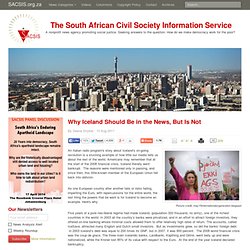
Americans may remember that at the start of the 2008 financial crisis, Iceland literally went bankrupt. The reasons were mentioned only in passing, and since then, this little-known member of the European Union fell back into oblivion. As one European country after another fails or risks failing, imperiling the Euro, with repercussions for the entire world, the last thing the powers that be want is for Iceland to become an example.
Here's why: Five years of a pure neo-liberal regime had made Iceland, (population 320 thousand, no army), one of the richest countries in the world. Contrary to what could be expected, the crisis resulted in Icelanders recovering their sovereign rights, through a process of direct participatory democracy that eventually led to a new Constitution. Iceland's bizarre Icesave referendum. This past weekend, the people of Iceland went to the polls in a referendum to vote on whether a deal should be passed to repay the British and Dutch governments for deposits lost in the Icesave online savings accounts when Iceland's Landsbanki collapsed.
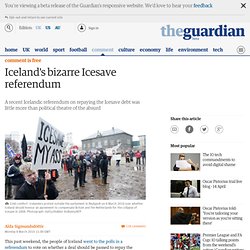
As the international media flocked to Iceland in the lead-up to the referendum, the phrase "theatre of the absurd" occurred. There seemed to be a popular misconception that the referendum was about far more serious things than it actually was – such as whether Iceland planned to repay the Icesave debt at all. Eirikur Bergmann: Iceland's government is on the point of collapse as angry protesters stake out the parliament in Reykjavik. Protesters gather in Reykjavik as members of parliament gathered for their first session of the new year.
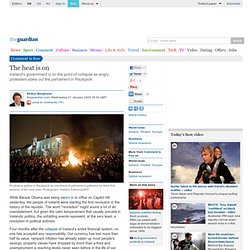
Photograph: Halldor Kolbeins/AFP While Barack Obama was being sworn in to office on Capitol Hill yesterday, the people of Iceland were starting the first revolution in the history of the republic. The word "revolution" might sound a bit of an overstatement, but given the calm temperament that usually prevails in Icelandic politics, the unfolding events represent, at the very least, a revolution in political activism. Four months after the collapse of Iceland's entire financial system, no one has accepted any responsibility.
Our currency has lost more than half its value, rampant inflation has already eaten up most people's savings, property values have dropped by more than a third and unemployment is reaching levels never seen before in the life of our young republic. It started in October with peaceful demonstrations. Yesterday parliament resumed for the first time after Christmas. Mob rule: Iceland crowdsources its next constitution. The new constitution will include checks and responsibilities for Iceland's parliament (the althing).
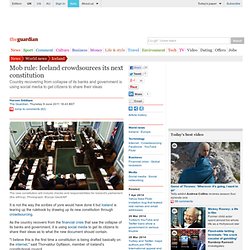
Photograph: Brynjar Gauti/AP It is not the way the scribes of yore would have done it but Iceland is tearing up the rulebook by drawing up its new constitution through crowdsourcing. As the country recovers from the financial crisis that saw the collapse of its banks and government, it is using social media to get its citizens to share their ideas as to what the new document should contain. "I believe this is the first time a constitution is being drafted basically on the internet," said Thorvaldur Gylfason, member of Iceland's constitutional council. "The public sees the constitution come into being before their eyes … This is very different from old times where constitution makers sometimes found it better to find themselves a remote spot out of sight, out of touch.
" Iceland's existing constitution dates back to when it gained independence from Denmark in 1944. Lessons from Iceland. Image from Democracy 2.0: Iceland crowdsources new constitution June 11 2011 | ROAR Magazine In just three years, Iceland went from collapse to revolution and back to growth.
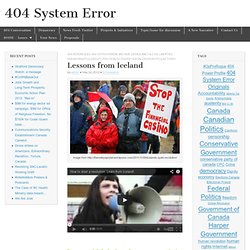
What can Spain and Greece learn from the Icelandic experience and its embrace of direct democracy? Just two or three years after its economy and government collapsed, Iceland is bouncing back with remarkable strength. Now, in an historically unprecedented move, the government has decided to draft a new constitution with the online input of its citizens — essentially crowdsourcing the creation of Iceland’s real democracy. How did Iceland get from there to here? Back in 2009, months after the greatest banking collapse in economic history, the people of Iceland took to the streets en masse to denounce the reckless bankers who had caused the crisis and the clueless politicians who had allowed it to develop. Wade helps us understand what not to do. What Iceland teaches us is that it need not be that way. Further Readings.